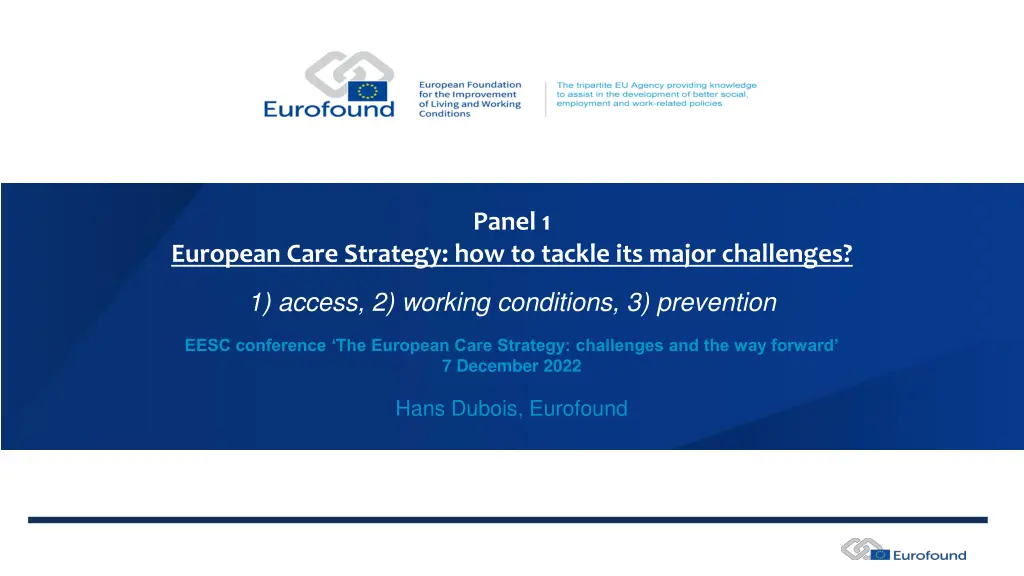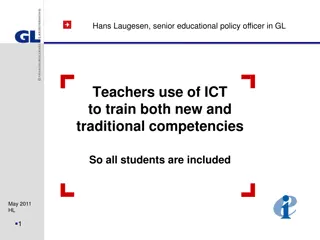
European Care Strategy: Addressing Access, Working Conditions, and Prevention Challenges
Discover the key challenges faced by the European Care Strategy, including access, working conditions, and prevention. Learn about initiatives to ensure better access to quality care, improve working conditions, and emphasize early intervention and prevention strategies. Join the discussion on shaping the future of care in Europe.
Download Presentation

Please find below an Image/Link to download the presentation.
The content on the website is provided AS IS for your information and personal use only. It may not be sold, licensed, or shared on other websites without obtaining consent from the author. If you encounter any issues during the download, it is possible that the publisher has removed the file from their server.
You are allowed to download the files provided on this website for personal or commercial use, subject to the condition that they are used lawfully. All files are the property of their respective owners.
The content on the website is provided AS IS for your information and personal use only. It may not be sold, licensed, or shared on other websites without obtaining consent from the author.
E N D
Presentation Transcript
Panel 1 European Care Strategy: how to tackle its major challenges? 1) access, 2) working conditions, 3) prevention EESC conference The European Care Strategy: challenges and the way forward 7 December 2022 Hans Dubois, Eurofound
Ensure better access and better quality of care All dimensions: from recognising care needs (e.g. contribution of ECEC to development especially for groups in vulnerable situations), to meeting them Good access to quality care, still too much depends on income. For LTC, this includes home care that matches needs and preferences of people with care needs, complements informal care, and is provided early-on when care needs emerge, helping to prevent and signal further care needs. Legal entitlements are important, but not enough. Many people in the EU do not get the benefits they are entitled to. People need to be aware of their entitlements and how to enforce them. But also: care needs to be of good quality and trusted, to be used. Personal assistance to support living & inclusion in the community UN Convention on the Rights of Persons with Disabilities: access to a range of in-home, residential and other community support services, including personal assistance necessary to support living and inclusion in the community, and to prevent isolation or segregation from the community Eurofound (2020) Report: Access to care services: Early childhood education and care, healthcare and long-term care
Improving working conditions Improving working conditions is a prerequisite for filling workforce gaps, and guarantee quality. Otherwise limited potential of policies such as: Increasing working hours among the many work part-time care workers (partly can be increased by providing better access to ECEC & LTC, as 20% of part-time care workers cannot work more hours due to informal care activities); facilitating work after the pension age (e.g. Germany during COVID). Domestic care workers: ratify & implement ILO convention on domestic workers! But some countries that did so, have many irregular domestic care workers. Better regulate, and prevent by good access to home care. Risk lack of action: Ukrainian refugees ending-up in risky sector, in countries where household incomes are increasing, and there is lack of public access to care. Better use public spending leverage (procurement, care allowances). Informal carers: work-life balance policies key, but look beyond employment-focused support. Importantly, many care providers are over the pension age. They also need to be supported (social inclusion, health). Childcare: became very apparent during the pandemic when in Italy informal childcare providers suddenly received allowance. LTC: care strategy counselling, psychological support or respite care ; Eurofound (2022) Blog: Forthcoming European Care Strategy must look towards the future Eurofound (2022) Report: Long-term care workforce: Employment and working conditions
Early intervention and prevention Prevention importantly can come from outside the health and care sector: working and living conditions along the life course Living conditions include good quality housing and local areas, preventing health problems and disabilities (e.g. local areas that facilitate active mobility, homes that prevent falls and can be kept at adequate temperature); care and support needs once there are health problems and disabilities (e.g. wide sidewalks where you can move around with walker/wheelchair, high-quality local areas along their physical, social and service dimensions). Eurofound (2023 forthcoming) Affordable and adequate homes - The cost of and access to housing in Europe Eurofound (2022) COVID-19 and older people: Impact on their lives, support and care
https://anchor.fm/eurofound/episodes/Care-e1pmll7/a-a8o7b8o Hans.Dubois@eurofound.europa.eu






















